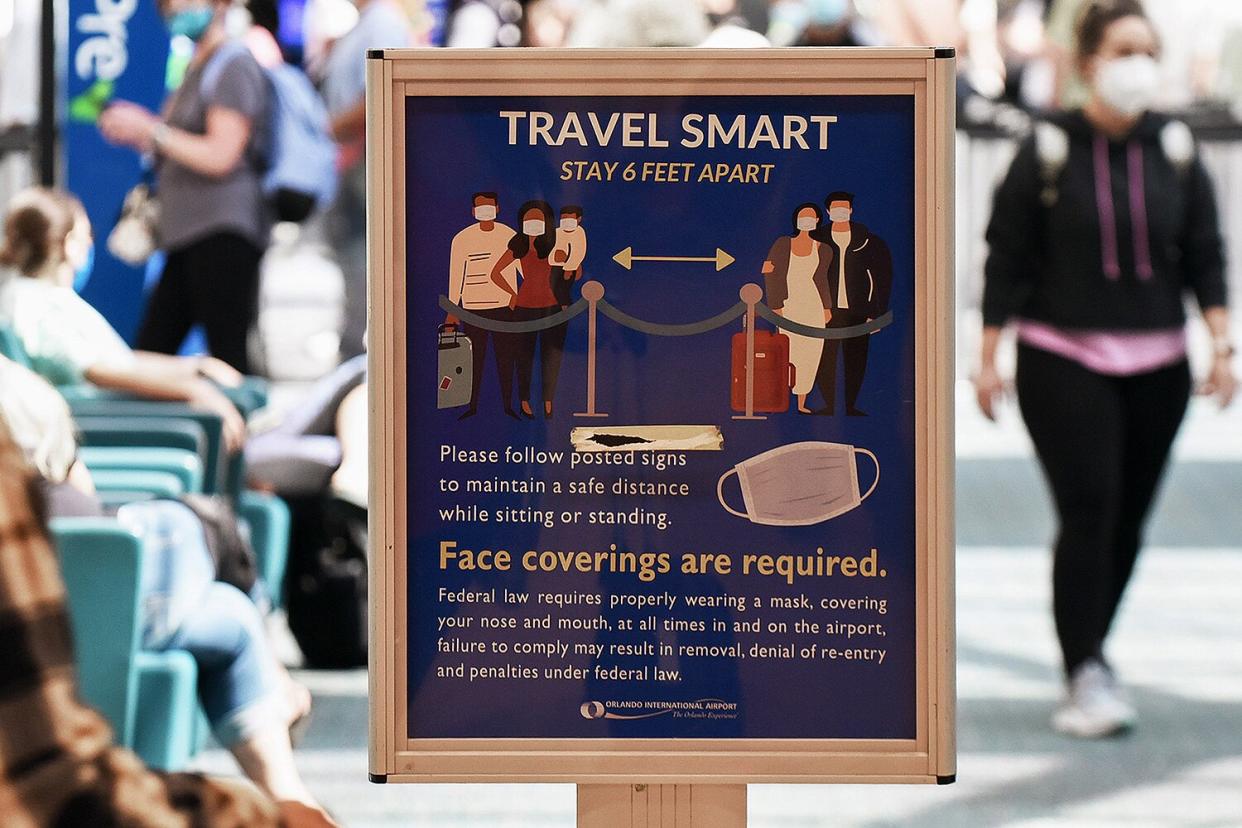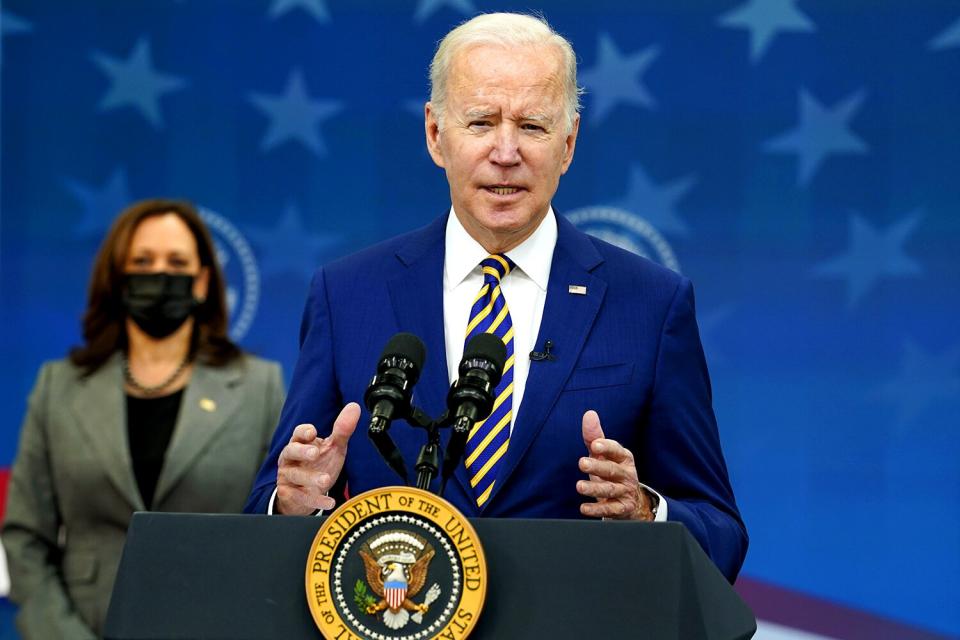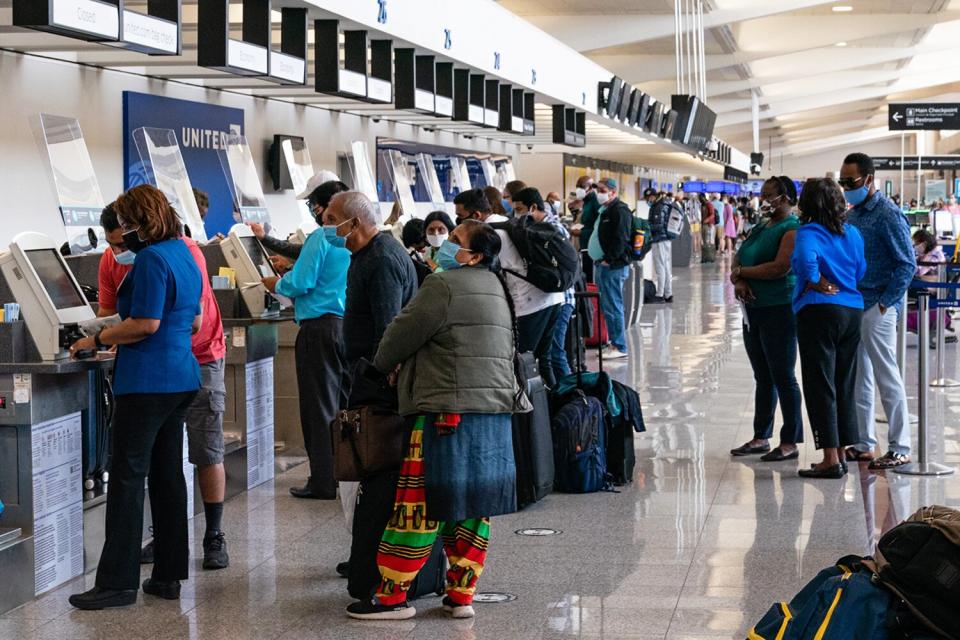How Will the Omicron COVID Variant Affect Travel in the U.S.? Here's Everything to Know

- Oops!Something went wrong.Please try again later.
Paul Hennessy/SOPA Images/LightRocket via Getty Images
A new COVID-19 variant could have a major impact on travel in the United States in the near future.
The Omicron variant, formally known as B.1.1.529, was first identified in Botswana on Nov. 25 and since then, several countries have been taking action to slow down the spread.
New information about Omicron continues to come to light, but the World Health Organization suggests it poses a "very high" risk globally and the "likelihood of potential further spread of Omicron at the global level is high."
As a result, some countries and territories have closed their borders to certain areas and implemented mandatory quarantines.
Additionally, the World Health Organization issued an advisory this week recommending that people 60 and over reconsider their holiday travel while more information about the variant is discovered.
So, how exactly will travel in the U.S. be affected by the Omicron variant? Read ahead for everything we know.

Evan Vucci/AP/Shutterstock
What are current travel restrictions?
On Nov. 26, President Joe Biden announced that the U.S. would be restricting travel from South Africa and seven other countries. The air travel restrictions went into place on Nov. 29 and prohibit travelers from South Africa, Botswana, Zimbabwe, Namibia, Lesotho, Eswatini, Mozambique and Malawi from coming to the U.S.
Biden explained that the reason for the travel bans was to give the U.S. more time to take action. "The objective here is not to punish, it is to protect the American people," press secretary Jen Psaki said in a press briefing on Nov. 29. "This is not going to prevent, it is going to delay. And that delay is going to help us have necessary time to do the research by our health and medical teams, to get more people vaccinated and get more people boosted. And he is always going to err on the side of protecting the American people."
What are future travel restrictions?
Biden hasn't announced any new travel restrictions, but Dr. Anthony Fauci predicted it would only be a matter of time before the Omicron variant begins circulating in the U.S. (And in fact, the first case was detected in California Dec. 1.)
"While we have said that travel restrictions can slow the speed of omicron, it cannot prevent it. Here's what it does: it gives us time," Biden previously said.
Robert A. Norton, a professor of Public Health at Auburn University and a member of several COVID-19 task forces, tells PEOPLE, "An important point to note about Omicron is that South Africa was the first place to report Omicron, but may or may not have been the point of origin."
RELATED: U.S. Records Its First Case of the Omicron Variant in California, CDC Confirms
He adds, "My prediction is that once other nations start looking for Omicron, they will likely find they have it as well. I suspect it may have been around for a few months in lots of places although in small numbers. Time will be necessary to determine whether Omicron will end up being the predominant variant or Delta will continue its trend."
In addition to South Africa and the U.S., cases of Omicron have already been detected in Canada, Australia, Israel, the United Kingdom, Italy, Germany, France, and Hong Kong, according to The Washington Post.
At the moment, Biden doesn't anticipate more "shutdowns or lockdowns" in the U.S. but has been encouraging people to get vaccinated. "I'll be putting forward a detailed strategy outlining how we'll fight COVID this winter. Not with shutdowns and lockdowns, but with widespread vaccinations, boosters, testing, and more."
Norton adds that while it's "difficult to predict how the Biden Administration will react" to the Omicron variant in the coming months, he emphasizes that "properly managed, temporary travel restrictions can help slow the spread, but it doesn't necessarily stop the evolution of the virus."
"Travel restrictions with this variant, given the mild symptoms will not stop the spread in the long run, just delay it," Norton explains. "If a series of mutations can occur in one place, they can also occur elsewhere and independently. Good screening protocols of travelers are essential in preventing the spread, enabling the global economy to continue to work."

Elijah Nouvelage/Getty
How will the Omicron variant affect air travel and cruises?
In the past few months, air travel and cruise travel have seen a steady increase, and so far, the travel industry has not indicated that a new variant might change their plans. (However, some governments may take preventive measures; Japan, for instance, has already asked airline operators to cease taking new international reservations for the remainder of the year in an effort to curb the spread of Omicron.)
While it's difficult to anticipate the effects of Omicron on upcoming holiday travel, Norton senses that "airplane travel and cruise ship travel will likely continue to expand closer to normal this year."
He adds, "Once therapeutics are available, I would expect a significant increase in pleasure travel of all varieties. People are suffering from COVID fatigue and have lots of pent-up energy that could drive a desire to get up and get away. Outdoor activities are very safe and don't require masks, so I anticipate that 2022 could bring a very safe and successful year. People will still get sick from COVID, but the therapeutics and the anticipated universal Coronavirus vaccines (maybe a couple of years away) will be game-changers."
Norton also notes that "travel decisions are very individual and dependent on a variety of elements."
"People with underlying comorbidity must continue to take COVID seriously," he continues. "COVID continues to kill, but it is here to stay. If people measure the risk as manageable and want to travel, then they should do so. Everyone should continue to practice good sense."
And while scientists are closely monitoring whether Omicron is as transmissible or deadly as previous strains of the virus, Norton is hopeful to see a variant of the strain that can be managed with some semblance of normalcy.
"It's too early to say with any degree of certainty, but Omicron may be an indicator that the virus is attenuating, meaning at least this strain is less virulent than the wild type first experienced in Wuhan, China," he says. "There is an abundance of opinion in the medical and scientific community, but it appears that COVID is rapidly becoming an endemic virus, meaning it is not going to go away. We will need to learn to live with it, manage it when it pops up, perhaps eventually seasonally and get on with our lives."
As information about the coronavirus pandemic rapidly changes, PEOPLE is committed to providing the most recent data in our coverage. Some of the information in this story may have changed after publication. For the latest on COVID-19, readers are encouraged to use online resources from the CDC, WHO and local public health departments. PEOPLE has partnered with GoFundMe to raise money for the COVID-19 Relief Fund, a GoFundMe.org fundraiser to support everything from frontline responders to families in need, as well as organizations helping communities. For more information or to donate, click here.
